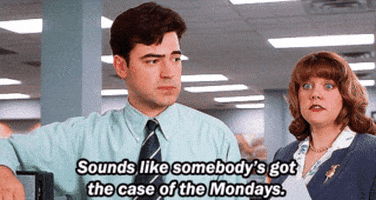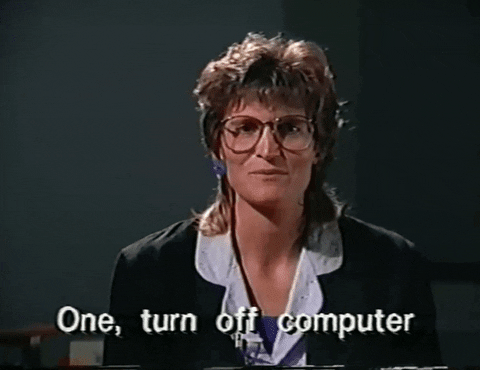In the world Christ has enacted, it is rest, not toil; fruitfulness, not scarcity; freedom, not fear; life, not death; that have the final word. Because of that, we can (indeed must) permit ourselves to enter into the humility of being recreated.
Earlier this spring, I resigned as Communications Coordinator for a nation-wide Christian nonprofit in Canada—my last day is Friday.
I’ve been in this role for 5 years alongside building my writing and coaching practice, previously serving in smaller roles within the same organization.
Manning (womanning?) the helm of communications through the long pandemic era has been a unique gift, with countless learning opportunities and connections that will nourish me for life. I will miss this organization and the people in it.
Still, juggling full-time communications work with a growing coaching practice and writing career takes its toll. The burnout has been building for a long time.
What finally prompted me to take action was knowing that if I continue in this direction, I won’t be able to continue showing up meaningfully—for my life, relationships, writing, clients. I’ve experienced profound burnout before, and am not sure I’m up for another round.
Something had to give.
I don’t know what’s next. I’m hoping to transition into coaching full time and get back to writing in a deeper way, but it’s not clear what that will look like or how God will provide. (Prayers appreciated!)
In the meantime, I’m slowing down and taking time to reflect on burnout, in particular why I (not to mention many of my fellow “professional Christians”1) seem particularly prone to it.
What does it mean when Christians get burned out? Here are a few thoughts that come to mind as I enter into this new season.
1. It may mean we need to spend some time listening.
To ourselves (in particular our heart, that wise, quiet, inner prayer-chamber of our being). To trusted others. And especially to God—including His silence, His stillness.
Many of us in helping professions or public-facing Christian ministry spend more of our time expending and expounding—giving our services and words to others—than we do receiving, listening, allowing ourselves to be filled. If we aren’t vigilant, we will eventually begin drawing from an empty well.
This is a unique danger, I think, for those of us in communications-heavy vocations—writers, preachers, counselors, coaches. There is a particular emptiness that can come when you make your living from words, and when you neglect to stock your creative spirit that well of words dries up, tires out, fogs over. I’m learning in these times how important it is to allow myself time when I can simply be still, as the Psalmist says, in all ways, but especially creatively. To let the words lay fallow. To let others—poets, novelists, Scripture—do the speaking for me, while I listen and receive.
Burnout may mean we need to spend some time listening… Especially to God—including His silence.
2. It may mean we need to hold space for Sabbath.
Just as every week returns to find its rest in the Sabbath, I find that every season of burnout brings a personal return to the necessity of Sabbath in my life.
By Sabbath, I am not referring to aimless rest, but a kind of recreative stillness. A momentary ceasefire on the thrumming battlefield of chronos time.
I’ve experienced numerous periods of burnout in my life, and no matter what other factors contribute to it, there is always (always!) an element of forgetting Sabbath. Forgetting that, in the world Christ has enacted, it is rest, not toil; fruitfulness, not scarcity; freedom, not fear; life, not death; that have the final word. Because of that, I can (indeed must) permit myself to enter into the humility of being “re-created.”
3. It may mean we need to allow ourselves the grace to change and evolve.
Sometimes burnout happens when we grasp an identify—or part of an identity—for so long and hard—or in so rigid a way—that we are prevented from growing or moving forward.

This resonates with me:
“Because of the uncertainty around transitions and the possible ramifications they have for our identity and livelihood, we usually go through them privately, then share the transition once we have a stronger sense of where we have arrived, or at least have paused on the journey.”
, Professional Christian: Being Fully Yourself in the Spotlight of Public Ministry (p. 150)
I put off making this particular change, mainly because I wanted to have all my ducks in a row—financially, professionally, etc. In the end, burnout—and the likely prospect of it worsening—has made the choice for me.
And perhaps there’s a kind of wisdom, or at least grace, in that.
Have you ever been through burnout? Any words of wisdom as I embark on this new season?
P.S. Are you thinking about next steps or needing to make positive but gentle changes in your life, too? You don’t have to go it alone.







This makes me reflect on how often I've had to come back to those simple, yet profound, words: "Be still and know that I am God". My inclinations almost always lie in the other direction of busyness and distraction.
My major encounter with burnout came when I was living overseas as a missionary (4 years). It was during this time that I encountered the Orthodox Church for the first time. As a zealous Protestant/Evangelical, it threw a major wrench into a lot of my unevaluated presuppositions. This kicked off a frenetic deep dive into Church history, theology, the Church Fathers and other Orthodox writings. I devoured anything I could get my hands on, in a search for apodictic certainty on which way to go, all whilst still leading small groups on extended trips to other countries and doing the work of a missionary. This proved a fools errand, but ultimately lead to me leaving the mission field in a very dark and confused place and collapsing into a complete lack of involvement in anything related to Christianity or church for about 5 years. I did eventual enter the Church, but it took me 10 years of wandering in the wilderness. I don't have any grand words of wisdom as I don't think I handled my situation well. Perhaps only that (and it doesn't sound like this applies to you) any kind of rest, recovery, regrouping etc. cannot extend to the life of prayer and involvement in the Church. I'm firmly convinced "I need a break from prayer" is never the right answer. Maybe our prayer changes, and is sometimes nothing more than lighting a candle and sitting in front of an icon for 15 minutes in absolute quiet. To stop praying, though, is to stop breathing; it is to die spiritually. Even if all we can manage are tiny gasps. In the words of Elder Arsenie Papacioc (who suffered unimaginably in the Romania gulags):
"Don't give up! No matter how little you are, no matter how tired, you mustn't give up. For, I repeat, no misfortune means anything. Nothing is lost as long as faith is established, the soul doesn't surrender, and you raise you head again! God forbid that you be sad! don't be afraid!"
Thank you. Hope to join you with "Safer Goals."
Natalie Kuchta